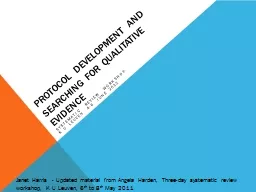PPT-Inspiring Initiatives in Qualitative Inquiry
Author : danika-pritchard | Published Date : 2016-04-21
Focus Group Interviews Indianapolis 12 April 2013 ACRL 2013 Imagine Innovate Inspire Lynn Silipigni Connaway Ph D Senior Research Scientist OCLC LynnConnaway
Presentation Embed Code
Download Presentation
Download Presentation The PPT/PDF document "Inspiring Initiatives in Qualitative Inq..." is the property of its rightful owner. Permission is granted to download and print the materials on this website for personal, non-commercial use only, and to display it on your personal computer provided you do not modify the materials and that you retain all copyright notices contained in the materials. By downloading content from our website, you accept the terms of this agreement.
Inspiring Initiatives in Qualitative Inquiry: Transcript
Download Rules Of Document
"Inspiring Initiatives in Qualitative Inquiry"The content belongs to its owner. You may download and print it for personal use, without modification, and keep all copyright notices. By downloading, you agree to these terms.
Related Documents














